Even airline-rewards customers are getting parental leave now
Delta Air Lines has announced a change that should please frequent flyers who are also new parents: Customers can now maintain their elite status even after taking a long break from regular travel.


Delta Air Lines has announced a change that should please frequent flyers who are also new parents: Customers can now maintain their elite status even after taking a long break from regular travel.
Typically, airline loyalty program customers lose their status if they stop accumulating miles or loyalty points for a prolonged period. That means no more upgrades, automatic access to airport lounges, and other perks that make flying more civilized. But, now, if your globe-hopping is brought to an abrupt halt because of a major life event, including the birth of a child, Delta will allow you to explain the change in your flying habits and request that your pre-break status be reinstated. (You can also now apply to reclaim your status after a job loss, personal accident or illness, family illness, or a return to school to get a degree.)
This means that if you’re a loyal Delta customer, you’re now eligible for a parental benefit of considerable value, which is more than the vast majority of full-time American workers can say. As Quartz at Work regularly reminds readers, the US comes in dead last among developed nations when parental leave benefits are compared and charted, with only 14% of Americans having access to any paid parental leave benefits, according the latest report from Pew Research.
Large US employers in certain industries, like banking and technology, do offer their employees relatively generous paid parental leave, and other related perks, like high-tech cribs, to accompany their higher-than-average incomes. Even in these cases, however, paid leave typically lasts three to five months—six, if you’re lucky—which is a far cry from the year or more of paid leave that employers are obligated to offer new parents in countries like Canada, Chile, Japan, Korea, and across most of Europe. New parents at Delta itself are eligible for six to nine weeks of paid leave, and up to 12 weeks of unpaid time off.
Presumably there’s a good bit of crossover between the elite flyers of major US airlines and the subset of Americans who work in industries that have made parental-leave benefits part of the arms race for white-collar talent. Their expectations for how their major life changes will be accommodated are naturally different now, even if their needs are the same as everyone else’s.
A few other airlines also offer similar programs that are not quite as extensive as Delta’s, according to Fast Company. So the trend is clear: In a sense, large airlines are treating elite customers with more compassion and empathy for the obvious ways in which their lives have been rearranged than most US companies do their dedicated staff.